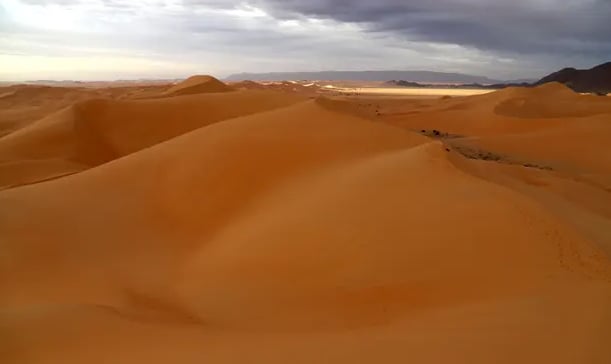November 27, 2025 | 23:42 GMT +7
November 27, 2025 | 23:42 GMT +7
Hotline: 0913.378.918
November 27, 2025 | 23:42 GMT +7
Hotline: 0913.378.918

Dust from desert storms has helped cool Earth for decades. Photo: Souleymane Ag Anara/AFP/Getty Images
Dust that billows up from desert storms and arid landscapes has helped cool the planet for the past several decades, and its presence in the atmosphere may have obscured the true extent of global heating caused by fossil fuel emissions.
Atmospheric dust has increased by about 55% since the mid-1800s, an analysis suggests. And that increasing dust may have hidden up to 8% of warming from carbon emissions.
The analysis by atmospheric scientists and climate researchers in the US and Europe attempts to tally the varied, complex ways in which dust has affected global climate patterns, concluding that overall, it has worked to somewhat counteract the warming effects of greenhouse gasses. The study, published in Nature Reviews Earth and Environment, warns that current climate models fail to take into account the effect of atmospheric dust.
“We’ve been predicting for a long time that we’re headed toward a bad place when it comes to greenhouse warming,” said Jasper Kok, an atmospheric physicist at UCLA who led the research. “What this research shows is that so far, we’ve had the emergency brake on.”
Oil refinery, owned by Exxon Mobil, the second largest in the US in Baton Rouge, Louisiana
About 26m tons of dust are suspended in our atmosphere, scientists estimate. Its effects are complicated.
Dust, along with synthetic particulate pollution, can cool the planet in several ways. These mineral particles can reflect sunlight away from the Earth and dissipate cirrus clouds high in the atmosphere that warm the planet. Dust that falls into the ocean encourages the growth of phytoplankton – microscopic plants in the ocean – that absorb carbon dioxide and produce oxygen.
Dust can also have a warming effect in some cases – darkening snow and ice, and prompting them to absorb more heat.
But after they tallied everything up, it seemed clear to researchers that the dust had an overall cooling effect.
“There are all these different factors that play into the role of mineral dusts in our atmosphere,” said Gisela Winckler, a climate scientist at the Lamont-Doherty Earth Observatory at Columbia University. “This is the first review of its kind to really bring all these different aspects together.”
Although climate models have so far been able to predict global heating with quite a bit of accuracy, Winckler said the review made clear that these predictions haven’t been able to pin down the role of dust especially well.
Limited records from ice cores, marine sediment records, and other sources suggest that dust overall had also been increasing since pre-industrial times – in part due to development, agriculture, and other human impacts on landscapes. But the amount of dust also seems to have been decreasing since the 1980s.
More data and research is needed to better understand these dust patterns, Winckler said, and better predict how they will change in coming years.
But if dust in the atmosphere is decreasing, the warming effects of greenhouse gases could speed up.
“We could start to experience faster and faster warming because of this,” Kok said. “And maybe we’re waking up to that reality too late.”
(The Guardian)

(VAN) A new study reveals how the simultaneous effects of ocean acidification, salinity and loss of oxygen are making the world more fragile.

(VAN) Hopes are growing that the creation of the first 3D turkey gut model could be a turning point in the battle against the virulent blackhead disease.

(VAN) Tyson, America’s biggest meat supplier, plans to shutter one of its largest beef processing plants as the industry continues to struggle with low cattle supplies and political pressure from Washington.

(VAN) New FAO study shows how digital solutions are empowering farmers and fishers to prevent losses and build resilient agrifood systems.

(VAN) Brazil's COP30 presidency pushed through a compromise climate deal on Saturday that would boost finance for poor nations coping with global warming but that omitted any mention of the fossil fuels driving it.

(VAN) Poultry farmers in the UK have been warned that they could face one of the worst winters yet for bird flu.

(VAN) Prices of main-crop paddy have risen sharply, with jasmine rice hitting 16,100 baht per tonne — the highest level in years.